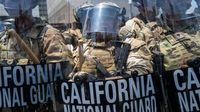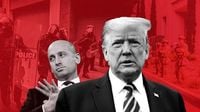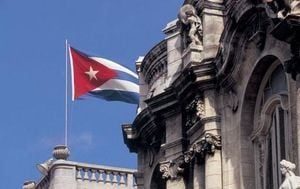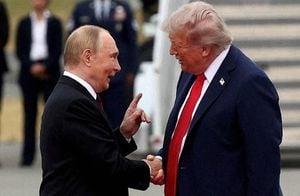In a legal battle that has drawn national attention, a federal appeals court has maintained a block on the Trump administration’s attempt to deploy federalized National Guard troops on the streets of Illinois, particularly in Chicago, while allowing the federal government to retain control over the troops themselves. The ruling, handed down by the Seventh Circuit Court of Appeals on October 11, 2025, comes amid ongoing protests at U.S. Immigration and Customs Enforcement (ICE) facilities and follows a series of similar legal skirmishes in other states, notably Oregon.
The controversy began when U.S. District Judge April Perry issued a temporary restraining order on October 9, 2025, which halted the deployment of National Guard troops from any state into Illinois. The Trump administration swiftly appealed, seeking to overturn the order and arguing that the deployment was necessary to protect federal property and personnel, especially as demonstrations continued outside ICE facilities in Chicago. According to a declaration from a U.S. Army official cited by CBS News, approximately 200 federalized National Guard troops from Texas and 14 from California were already present in Illinois, alongside another 300 Guardsmen from Illinois who had been mobilized by presidential order—despite objections from Illinois Governor JB Pritzker.
The Seventh Circuit’s decision was nuanced: while it kept the block in place on deploying National Guard troops on Illinois streets, it granted a partial stay, allowing the federal government to maintain control over the troops. As the court’s order stated, "Members of the National Guard do not need to return to their home states unless further ordered by a court to do so." This means that the troops remain federalized and stationed in Illinois, but are not authorized to engage in street-level enforcement or crowd control duties within the state’s communities, unless the legal situation changes.
The Defense Department explained the rationale for the deployment, telling CBS News that the federalized troops were sent to the Chicago area for a period of at least 60 days to "protect U.S. Immigration and Customs Enforcement and other U.S. Government personnel who are performing federal functions, including the enforcement of federal law, and to protect federal property." The ICE processing facility in Chicago has been a particular flashpoint, with ongoing confrontations between protesters and law enforcement fueling the federal government’s concerns about security and order.
Illinois Attorney General Kwame Raoul, who has been a vocal opponent of the Trump administration’s approach, hailed the court’s decision as a win for state and local autonomy. "This is a victory for our state," Raoul said in a statement, as reported by ABC News. "This is a victory for state and local law enforcement — who know their communities and who protect the right of their communities to speak truth to power." Raoul’s remarks highlight a broader debate over the balance of power between federal authorities and state governments, especially in times of civil unrest.
The legal wrangling in Illinois is not occurring in isolation. Just a week earlier, a similar situation unfolded in Portland, Oregon, where a Trump-appointed federal judge issued a temporary restraining order blocking the federalization and deployment of Oregon National Guard troops in the city. The following day, the same judge extended the order to prohibit any National Guard troops from other states from entering Portland, even as the Pentagon had announced plans to send an additional 200 California National Guard troops there. The Ninth Circuit Court of Appeals later granted a temporary stay, allowing the Oregon troops to remain under federal control but maintaining the prohibition on their deployment to Portland while the case proceeds.
These legal battles come at a time of heightened tension across the country, as demonstrations and protests—often focused on immigration policy and law enforcement practices—have erupted in major cities. In Chicago, the ICE facility has become a focal point for activists demanding changes to federal immigration enforcement and expressing solidarity with those detained or affected by ICE operations. According to CBS News, the presence of federalized National Guard troops, even if confined to federal property, has added a new layer of complexity to the already fraught relationship between protesters, local authorities, and the federal government.
For the Trump administration, the deployment of National Guard troops under federal authority is seen as a necessary measure to ensure the safety of federal personnel and property. However, critics argue that such moves risk undermining local control and escalating tensions on the ground. Governor JB Pritzker, for instance, has objected to the federal mobilization of Illinois Guardsmen, emphasizing the importance of state sovereignty and the ability of local officials to manage their own law enforcement responses.
Legal experts note that the current standoffs in Illinois and Oregon could set important precedents for the federal government’s ability to intervene in states’ affairs during periods of unrest. The courts’ decisions to uphold blocks on deployment, while permitting continued federal control over National Guard troops, reflect an attempt to balance the federal government’s interest in maintaining order with respect for state authority and the rights of local communities.
Meanwhile, the practical implications of the rulings remain significant. As the Seventh Circuit made clear, "The court's order today keeps the troops off the streets of Chicago, Broadview or any other community in Illinois," as Attorney General Raoul put it. Yet the continued federalization of the troops means they are available for rapid deployment should the courts ultimately side with the administration or if circumstances on the ground shift dramatically.
In the broader context, the disputes in Chicago and Portland are emblematic of a nation grappling with questions about the proper role of federal power, the limits of executive authority, and the rights of states to govern their own affairs. As protests continue and legal challenges work their way through the courts, both supporters and critics of the administration’s approach are watching closely, aware that the outcomes could shape the contours of federal-state relations for years to come.
For now, the federalized National Guard troops remain in Illinois, under federal control but off the streets—a compromise that satisfies neither side entirely but reflects the complex realities of American governance in a turbulent era.






